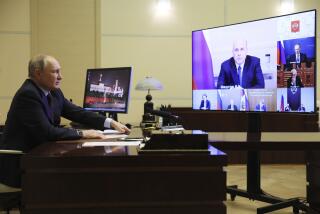Nuclear Testing and National Security
- Share via
* Jon Kyl, in “The Real Story: We Rejected a Bad Treaty” (Commentary, Oct. 21), says the Comprehensive Test Ban Treaty would have undermined the U.S. nuclear deterrent because “testing has been essential to maintaining our arsenal” and “the treaty was not verifiable.”
Thirty-two Nobel laureates say different. They signed a statement arguing that it is imperative that Congress approve the treaty to “halt the spread of nuclear weapons.” The American Geophysical Union and the Seismological Society of America released an unpre- cedented joint statement expressing confidence in the treaty’s verification scheme. Charles Townes, a UC Berkeley physicist who co-invented the laser, says, “My colleagues and I . . . have concluded that nuclear testing is simply not required to retain confidence in America’s nuclear deterrent.” So much for Kyl’s objections. Yet Kyl chooses to believe a gaggle of politicians who take millions from the weapons lobby over the opinions of these renowned scientists.
ANN ALPER
Pacific Palisades
* From “Senate Defeat of Test Ban Treaty” (letters, Oct. 19), I see that the “partisan politics” mantra is in full swing. I would just like to remind those who thought the treaty was such a great thing that those opposed included six former defense secretaries, four former CIA directors (including two Clinton appointees), four former national security advisors, three former energy secretaries, three former directors of the national nuclear laboratories and Henry Kissinger, the king of arms agreements.
PETER DE MARTINO
Thousand Oaks
* Those who argue that the recently defeated nuclear test ban treaty was unenforceable are either lying or misinformed. In 1949, when the Soviets exploded their first atomic bomb, we detected it at once by simply measuring the increased radioactivity in arctic air. True, tests are underground now. But for 30 years, we have lofted increasingly sophisticated satellites whose job it is to detect missile launches and nuclear explosions. If anyone sets off a nuke anywhere on Earth, we will know about it.
THOMAS E. BRAUN
Glendale
More to Read
Sign up for Essential California
The most important California stories and recommendations in your inbox every morning.
You may occasionally receive promotional content from the Los Angeles Times.













